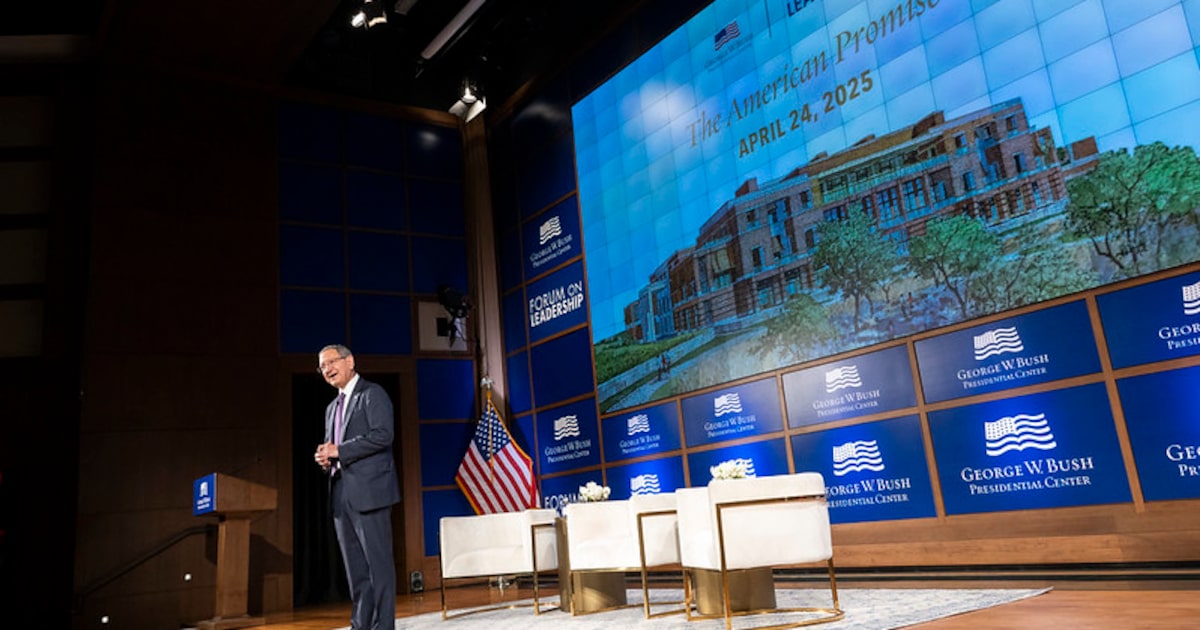As my tenure leading the George W. Bush Presidential Center ends this week, I’m reflecting on something I gleaned from observing President Bush’s servant-leadership style: A leader’s job boils down to focusing on the four “S” factors – safety, security, solvency and sanity.
Safety
A leader should ensure the organization is safe from dangers so members can go about their daily tasks. In the private sector, this means creating a healthy culture where people feel safe to work. I have found that “feeding the winners” on a team produces a better outcome than berating the underperformers. Reward those who excel, and others will model that behavior and step up their game.
At a national level, providing for national defense and public safety is a basic duty. Plus, using soft power to help vulnerable people abroad builds goodwill and prevents extremism, and, thus, serves our security interest.
President George W. Bush’s legacy of preventing the spread of HIV/AIDS in Africa has saved over 26 million lives and made us safer here by stabilizing societies that otherwise could have posed threats.
Opinion
Playing the long game is a leader’s role. Anticipating threats and dealing with them early is critical. When the war starts, it’s too late to design weapons and build alliances.
Security
A child’s security blanket provides peace of mind, even if it doesn’t have actual powers. Populations, big and small, need a blanket of security to function.
At a governmental level, that blanket comes from taking care of the commons — a strong defense of our constitutional rule of law along with well-functioning institutions that support infrastructure like safe and dependable water, energy, roads and airports. The additional commons of education, child care and a functioning public health system provide a blanket of security also.
In America, our founders laid out another concept for our security — that citizens should be protected from government. The public sector’s essential role was to govern the people, from whose consent its power originated, yet remain limited. Designing a system to avoid authoritarianism, James Madison wrote in Federalist 51 of this irony: “You must first enable the government to control the governed; and in the next place oblige it to control itself.”
Freedom from government has taken on new meaning in the past decades as Congress increasingly ceded power to the executive branch. Without legislation to check executive overreach, the electorate is exposed to “policy whiplash” as progressive and conservative leaders govern by issuing and undoing each other’s edicts. Plus, each faction has used such power to target political adversaries. Unfortunately, McCarthyistic targeting hasn’t been relegated to the history books.
We are now in the predicament in which freedom from government is not guaranteed. The resulting insecurity is obvious. When the governed are afraid of the governors, history teaches that neither sleeps well at night.
Effective leadership supports a vision of a professional and caring organizational culture in which people can take initiative. Leaders who govern by fear rarely get the best out of others.
The Bush Center thrives today because we put our values into action with a caring culture that prioritizes work-life balance while expecting excellence. I have found that demanding doesn’t have to be demeaning.
Solvency
Financial management cannot be left to the masses. Leaders must make hard choices to keep any financial house in order. Whether a family, a business or a public entity, fiscal irresponsibility doesn’t end well.
Budget discipline entails making difficult choices. But the alternative of running toward insolvency brings with it mammoth costs, too. Real leadership requires doing the right thing, even if it is unpopular, and not wishing away economic realities.
The Bush Center’s financial health today ensures our work will persist for the long term. We have grown our endowment sevenfold since 2016, while keeping our annual budget growth at about half the rate of inflation.
Sanity
The final “S” is more nuanced, but easy to understand when you see it. A leader has a critical ambassadorial role as “tone-setter-in-chief” to foster sanity, independent of policy priorities.
A leader who exudes optimism and decency can move a nation, as evidenced by John F. Kennedy and Ronald Reagan. Bill Clinton was a gifted consoler-in-chief. George W. Bush stood on the Ground Zero rubble after 9/11 and reassured a nation. “No-drama” Obama’s team was stable. Remaining positive and focused on serving the public helped keep us collectively sane, independent of policy effectiveness.
President Bush emphasizes often that the office of the presidency is more important than its occupant. The occupant borrows the chair of power from the electorate for a term and thus it is imperative that the president maintains its integrity for the next occupant. Shirking that responsibility with incoherent behavior weakens the office and models inconsistent behavior that leaves the public unmoored and destabilizes the future.
In public service, following a set of consistent governing principles keeps the ship of state on track. If the service aspect of leadership is dropped, any organization will founder. Legitimacy is preserved by avoiding the adage “rules for thee, but not for me.”
It’s been an honor to model President Bush’s perpetual optimism that our best days are ahead as the Bush Center works daily to further the ideals of freedom, opportunity, accountability and compassion. This has set the organization up for greater impact as we go.
As President Bush’s example set for me, effective leadership is grounded in principles committed to service and executed with humility.
So, too, in our democracy, power emanates from the governed, who delegate to leadership the responsibility of keeping us safe, secure, solvent and sane. It has been a privilege for me to put these concepts into action. History is pretty clear that those who don’t advance these principles eventually get fired.
Ken Hersh is outgoing president and CEO of the George W. Bush Presidential Center and co-founder and former CEO of NGP Energy Capital Management. His tenure at the Bush Center ends on Sept. 1.
